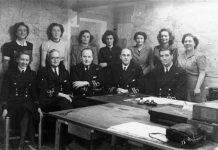Today is Monday, May 9, the 130th day of 2016. There are 236 days left in the year.
Highlights in history on this date.
1509 – Christopher Columbus sails from Cadiz on his fourth and last voyage to the New World, one that ends with his ships beached on Jamaica.
1688 – Holy Roman Emperor Leopold I signs a treaty with Transylvania, transferring the province from Turkish to Hungarian rule.
1788 – Britain passes parliamentary motion abolishing slave trade.

1877 – Romania proclaims its independence from the Turks just one month after it allied with Czarist Russia to fight the Ottoman Empire.
1914 – Mother’s Day is proclaimed in the United States.
1926 – U.S. Navy Commander Richard E. Byrd and Floyd Bennett become first men to make airplane flight over North Pole.
1933 – In Berlin, 25,000 books are thrown into bonfire in first of Nazi book burnings.
1936 – Italy annexes Ethiopia, and King Victor Emmanuel III is proclaimed emperor.
1944 – Soviet forces liberate Sevastopol in the Crimea in World War II.
1946 – Italy’s King Victor Emmanuel III abdicates and Umberto II proclaims himself king.
1955 – West Germany is admitted into NATO.
1960 – The U.S. Food and Drug Administration approves use of a birth control pill.
1967 – India’s Vice President Zakir Hussain is named president, becoming the first Muslim to hold that office.
1974 – The U.S. House of Representatives Judiciary Committee opens hearings on whether to recommend the impeachment of President Richard Nixon.
1978 – The bullet-riddled body of Italy’s former Prime Minister Aldo Moro is found in a parked car in central Rome, 54 days after his abduction by Red Brigade terrorists.
1980 – Liberian freighter rams the Sunshine Skyway Bridge over Tampa Bay in Florida, killing 35 motorists and causing a section of the bridge to collapse.
1990 – Tens of thousands of students and dissidents demanding ouster of president battle police in dozens of South Korean cities.
1991 – Between 100,000 and 400,000 protesters march in Seoul demanding the resignation of South Korean President Roh Tae-woo.
1992 – Police and inmates of Lima’s top security prison exchange gunfire as the government tries to retake a cell block held by Maoist rebels.
1993 – Fierce Croat-Muslim fighting breaks out in Mostar, Bosnia.
1994 – Hundreds flee fighting between rival armies in Aden, Yemen; South Africa’s newly elected parliament chooses Nelson Mandela to be the country’s first black president.
1995 – The U.S. Coast Guard turns over 13 Cuban boat people to Cuban authorities, the first application of a new U.S. policy designed to curb the stream of refugees from Cuba.
1998 – In an effort to get concessions on Kosovo, the United States, Britain, France, Germany, Canada, Italy and Japan freeze Yugoslav government assets and halt investment in Yugoslavia.
1999 – NATO launches new attacks on Yugoslav army positions in Kosovo despite outrage over the mistaken bombing of the Chinese Embassy in Belgrade the day before.
2000 – In a landmark human rights trial, 13 Indonesian soldiers admit they were following orders when they dragged 26 student activists into a field in Aceh province and killed them.
2001 – While in Iran, Cuban leader Fidel Castro receives a hero’s welcome and calls the United States an “imperialist king” that would fall just as the shah fell in 1979.
2002 – Maryland Governor Parris Glendening orders a moratorium on executions pending completion of a study to determine whether racial bias affected death penalty decisions.
2003 – The United States, Britain and Spain offer a draft U.N. Security Council resolution that would lift sanctions against Iraq and establish U.S.-led control of Iraq’s postwar reconstruction for at least one year.
2004 – A bomb rips through a stadium in the Chechen capital of Grozny during a Victory Day ceremony, killing provincial president Akhmad Kadyrov, the Kremlin-backed president leading efforts to control separatist violence in the war-wracked region. Separatist rebels are blamed for the attack, which also killed 24 other people.
2005 – Two U.S. Marines are killed as they check a cave pounded by warplanes in a five-hour battle in eastern Afghanistan that also leaves 23 insurgents dead.
2006 – Union leaders in Puerto Rico call off island-wide protests as a special commission looks for answers to a fiscal crisis that has partially closed the government and eroded the credit rating of the U.S. territory.
2007 – India test-fires a medium-range nuclear-capable missile meant for military use. The surface-to-surface “Prithvi” or “Earth” missile, with a range of 95 miles (150 kilometers), is fired from the test range in Chandipur in the eastern state of Orissa.
2008 – Myanmar’s junta seizes two planeloads of U.N. aid shipments meant for hungry survivors of the prior week’s devastating cyclone, prompting the world body to suspend further help. U.S. military planes loaded with aid are denied access by the country’s isolationist regime.
2009 – Jacob Zuma takes power in the culmination of an extraordinary political comeback, pledging to Nelson Mandela and the nation to renew the spirit of commitment and hope of South Africa’s first black presidency.
2010 – Experts say North Korea’s submarine fleet is technologically backward, prone to sinking or running aground, and all but useless outside its own coastal waters.
2011 — Two major credit agencies signal their concern about Greece’s massive debt, lending new credence to the view that European authorities must do more to help the country a year after it barely avoided bankruptcy with a bailout.
2012 — A decade after hijackers mostly from Saudi Arabia attacked the United States with passenger jets, the Saudis emerge as the principal ally of the U.S. against al-Qaida’s spinoff group in Yemen and at least twice have disrupted plots to explode sophisticated bombs aboard airlines.
2013 — Afghanistan President Hamid Karzai, who has irked Washington with his frequent criticism of American military operations in his country, says that his government is now ready to let the U.S. have nine bases across Afghanistan after most foreign troops withdraw in 2014.
Today’s Birthdays:
Giovanni Paisiello, Italian composer (1740-1816); James Pollard Espy, pioneering U.S. meteorologist (1785-1860); John Brown, U.S. anti-slavery activist (1800-1859); Sir James V. Barrie, English dramatist (1860-1937); Albert Finney, English actor (1936–); Glenda Jackson, English actress and politician (1936–); Candice Bergen, U.S. actress (1946–); Billy Joel, U.S. pop singer (1949–); James L. Brooks, U.S. director (1940–); John Corbett, U.S. actor (1961–).
Thought For Today:
Television has changed the American child from an irresistible force into an immovable object — Laurence J. Peter, Canadian-born educator (1919-1990).
Copyright 2016 The Associated Press. All rights reserved. This material may not be published, broadcast, rewritten or redistributed.




